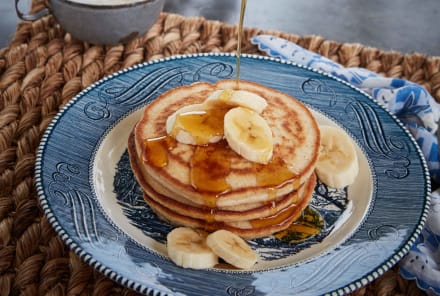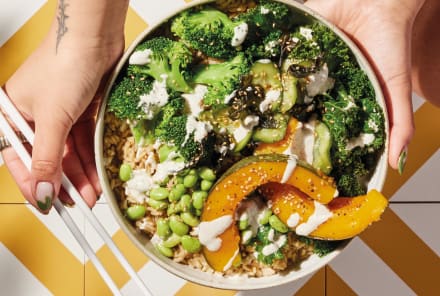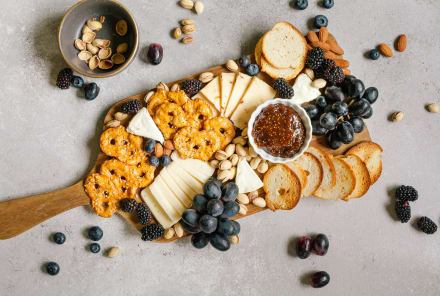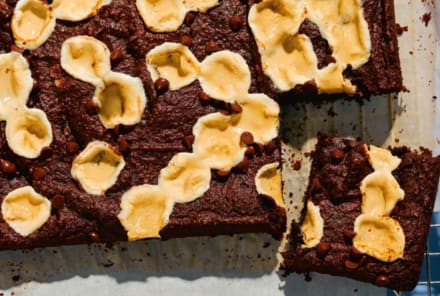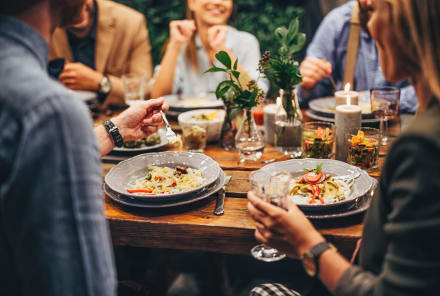Advertisement
I Quit Sugar 2 Years Ago. Here Are 7 Ways It's Totally Transformed My Life

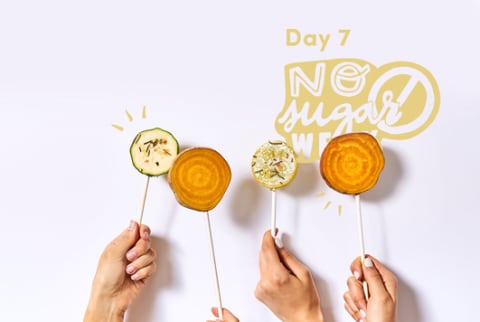
A quick Google search of sugar yields hundreds of thousands of results, including a slew of articles with the health buzzword of the year: inflammation. But when I officially decided to kick the sweet stuff to the curb about two years ago, no one was really uttering the “i” word yet. And if they were, I certainly wasn’t hearing it.
After some time spent volunteering on an organic farm, a summer interning in the health and wellness space, and a whole lot of time spent reading and researching as a result, what I was hearing was accelerated aging, increased risk of cancer, poor circulation, and cognitive impairment as a few of the not-so-sweet effects of sugar. I figured I’d cut back on it for a week, maybe two, and see if there was any validity to what sounded at the time like pretty extreme health claims.
I’ve always eaten my fair share of colorful produce and whole grains—and I have a feeling growing up in a household where home cooking was the norm and vegetables made a regular appearance at the dinner table had something to do with that. But boy, did I have a strong sweet tooth. My days, more often than not, would begin with a bowl of flavored yogurt and granola and end with the requisite scoop of ice cream or handful of chocolate chips. And you can bet if I was having afternoon tea, I was also having a blueberry muffin.
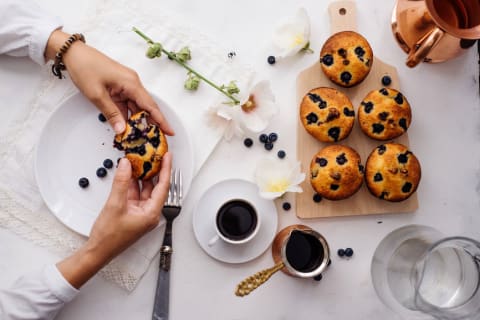
Although I didn’t nix natural sugars found in whole foods like fruit and yogurt, what I did kiss goodbye was any sort of added sugar which, if you haven’t already noticed, is in pretty much everything. Ketchup, salad dressing, canned peas, tomato sauce, bread, granola bars, peanut butter—not to mention the usual culprits like ice cream, chocolate, cupcakes, and my oh-so-beloved frozen yogurt. Fortunately, I’ve never liked carbonated beverages, so soda wasn’t a problem, but orange juice was a tough one, as was cereal.
I also cut way back on so-called “healthy sugars” like honey and maple syrup. Because while they may be glorified as unrefined, pure, or organic, what I soon came to realize is that sugar is sugar. Period. They all cause blood sugar levels to spike—some simply do it faster than others.
The first few days were the furthest thing from glamorous; I was craving sweets big time, having ridiculous PMS-type mood swings, and suffering from what I eventually learned were sugar-withdrawal headaches. Now don't get me wrong—I wasn't expecting it to be a walk in the park. But this felt like a full-on uphill marathon, and I was ready to reclaim my sanity.
But I didn't do it. Because however much I wanted to take a spoon to the nearest Nutella jar, I couldn't get all of the supposed health benefits of this whole sugar-free business out of my mind. Somewhere between the headaches, mood swings, and time spent salivating at the mere thought of a cupcake, there was a voice of reason telling me that all those articles I read weren't, in fact, hoaxes. It would just take a bit longer to see or feel any major changes.
So I decided to continue for one more week and promised myself that if there were no noticeable changes by then, I would call it off.
Sure enough, the tide began to change come week two. My headaches went away, the cravings subsided, and I actually felt good. Great, even, which got me thinking: if I could feel this way after two sugar-free weeks, what would I feel like after three weeks? A month? THREE months?
Suffice it to say that things kept getting better, because before I knew it one year had passed. And then two. And now, 730(ish) sugar-free days later...
1. Snacking has become a thing of the past.
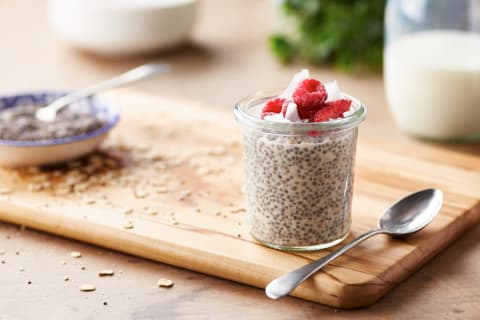
If you would have told me two years ago that come 3 p.m. my stomach wouldn’t grumble and beg me for an afternoon pick-me-up, I would have said something along the lines of “Ha! Yeah, right.” But somehow, my urge to graze throughout the day has subsided. Turns out when I began steering clear of sugar, I also ended up avoiding most packaged goods in favor of real, whole, fibrous foods, chock-full of healthy fats. Three full meals with the occasional afternoon snack is now enough to keep me satisfied throughout the day. It also doesn’t hurt that I began opting for full-fat dairy to avoid the low-fat/high sugar combo (plus, as we all know by now, fat is not the enemy).
2. Naturally sweet foods actually taste sweet.
With some of my former favorite “healthy” granola bars hovering around 15 grams of sugar, it’s no surprise that most Americans consume double, if not triple, the recommended 25 gram maximum per day. Our taste buds have become accustomed to an unnatural level of sweetness, which explains why naturally sweet foods, at least to me, never actually tasted that sweet—until now, that is.
3. My complexion improved.
My face has been riddled with acne for as long as I can remember. And although I’ve tried countless topical creams, scrubs, and even a few rounds of antibiotics, the results were always temporary. Dermatologists told me hormones were the problem, and although I may have believed that in ninth grade, I wasn’t so sure come senior year of college.
My acne didn’t disappear overnight, or even after a few weeks. It was actually around the end of month two when I began to notice changes. The puffiness subsided and my complexion became brighter (and far less oily).
4. I lost weight.
Losing weight was never the goal, so I didn’t give this much thought until I noticed myself slowly slimming down (especially around my belly area). Turns out sugar promotes hedonic eating, which is just a fancy way to say it tricks your brain into wanting more food. The less sugar I consumed, the less I found myself eating for reasons besides satiating my hunger. In other words, I wasn’t overeating.
5. My energy skyrocketed.

Swapping out sugary foods in favor of fat and protein-packed ones that take longer to digest; this meant I was no longer victim to the roller coaster of high and low energy. It became consistent, and has stayed that way for the better part of two years. And by stabilizing my blood sugar, I also experienced an unexpected (but welcome!) improvement in mental clarity. It didn’t take long for me to feel more focused, clear-headed and, as a result, productive in my day-to-day activities.
6. I became a better cook.
Before quitting sugar, I was an average cook at best with just a handful of tried-and-true meals in my repertoire (scrambled eggs being one of them). But with sugar hiding in so many unassuming ingredients, I began cooking at home more frequently. And the more I cooked, the more confident I became. Everything from homemade pesto and jam (thicken it with chia seeds—it’s revolutionary) to buckwheat pancakes, fermented socca, and root-vegetable chips became regulars in my kitchen.
7. My social life got, well, complicated.
I didn’t tell too many people that I was giving up sugar because frankly, I was afraid it would sound preachy. Plus, the few people I did tell became surprisingly defensive as if I was judging them for ordering dessert. So I kept my mouth shut. But when you’re the only one at happy hour who orders lemon water instead of a margarita (since I avoid all alcohol besides the rare glass of wine for holidays and special occasions), or when you’re on a date and politely decline the offer to get ice cream after dinner, things start to get awkward. And then comes the urge to justify yourself: You’re just not in the mood, or you’re not drinking tonight, or maybe you’ll get one later, and so on.
When the benefits of a dietary shift like going sugar-free are so numerous, it’s easy to forget the less-glamorous side effects. But this is real, and it’s hard, and it’s not talked about nearly enough.
So what’s next?
If going through a period of extremes is necessary in order to shift to a mindset of moderation, I’m definitely still in the extremes stage. But believe me—I wouldn’t have continued down this sugar-free path for two whole years if I thought it was all a fad, and I certainly don’t foresee myself biting into a doughnut anytime soon. What I do hope, however, is to arrive at a place of balance where the occasional, intentional indulgence (preferably with unrefined, low-glycemic sweeteners) can serve as a source of pleasure rather than anxiety. After all, I’m only human. And while sugar may not be the healthiest, neither is letting it (or any food, for that matter) dictate my relationships and distance me from the people in my life that mean so much more than any food ever could.
Missed out on the beginning on no-sugar week? Never fear—you can find tips, tricks, recipes, personal stories and so much more right here.
Watch Next
Enjoy some of our favorite clips from classes
Enjoy some of our favorite clips from classes
What Is Meditation?
Mindfulness/Spirituality | Light Watkins
Box Breathing
Mindfulness/Spirituality | Gwen Dittmar
What Breathwork Can Address
Mindfulness/Spirituality | Gwen Dittmar
The 8 Limbs of Yoga - What is Asana?
Yoga | Caley Alyssa
Two Standing Postures to Open Up Tight Hips
Yoga | Caley Alyssa
How Plants Can Optimize Athletic Performance
Nutrition | Rich Roll
What to Eat Before a Workout
Nutrition | Rich Roll
How Ayurveda Helps Us Navigate Modern Life
Nutrition | Sahara Rose
Messages About Love & Relationships
Love & Relationships | Esther Perel
Love Languages
Love & Relationships | Esther Perel
